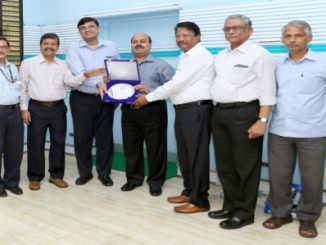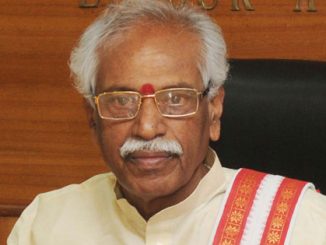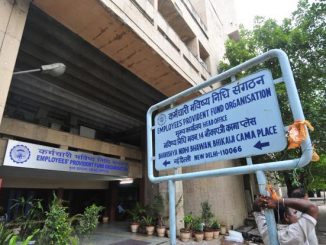
The Maternity Benefit (Amendment) Bill, 2016 is historic as it will go a long way in ensuring overall wellbeing of both mother and child and helping working women. Shri Bandaru Dattatreya, the Minister of State for Labour and Employment (Independent Charge) said this while briefing media on recently passed Bills by Parliament relating to the Ministry here today . The Minister said that 44th,45th and 46th Indian Labor Conferences recommended to enhance maternity leave to 24 weeks. The Ministry of Labour and Employment taking a balanced view proposed 26 weeks.
The Minister expressed satisfaction over the fact that four Bills relating to Labour Employment Ministry have been passed by Parliament. The Minister said Child Labour (Prohibition and Regulation) Amendment Bill,2012 have been passed by both Lok Sabha and Rajya Sabha. Two more Bills the Employees’ Compensation (Amendment) Bill, 2016 and Factories (Amendment) Bill, 2016 have also been passed by Lok Sabha while Rajya Sabha has passed the Maternity Benefit (Amendment) Bill, 2016.
Amendment to the Maternity Benefit Act, 1961.
Rajya Sabha has passed on 11th August, 2016 the Maternity Benefit (Amendment) Bill, 2016 which inter-alia include increasing maternity benefit to woman covered under the Maternity Benefit Act, 1961 from 12 weeks to 26 weeks upto two surviving children in order to allow the mother to take care of the child during his/her most formative stage, providing maternity benefit of 12 weeks to Commissioning mother (in case of surrogate child) and Adopting mother (in case of adoption), facilitate “work from home” to a mother with mutual consent of the employee and the employer, making mandatory in respect of establishment having fifty or more employees , to have the facility of crèche either individually or as a shared common facility within such distance as may be prescribed by rules & also to allow four visits to the crèche by the woman daily, including the interval for rest allowed to her and every establishment to intimate in writing and electronically to every woman at the time of her initial appointment about the benefits available under the Act.
2. Point-wise details :
(i) increase the maximum period of maternity benefit from the existing twelve weeks to twenty-six weeks, in case of women who have less than two surviving children and in other cases, the existing period of twelve weeks maternity benefit shall continue ;
(ii) to extend the maternity benefits to a “commissioning mother” and “adopting mother” and they shall be entitled to twelve weeks maternity benefit from the date of child is handed over;
(iii) to encourage employer to facilitate “work from home” to a mother by inserting an enabling provision;
(iv) to make it mandatory in respect of establishment having fifty or more employees , to have the facility of crèche either individually or as a shared common facility within such distance as may be prescribed by rules and also to allow four visits to the crèche by the woman daily, including the interval for rest allowed to her.
(v) every establishment shall intimate in writing and electronically to every woman at the time of her initial appointment about the benefits available under the Act.
3. Major impact:
(i) The decision will have major impact on the health, well being and growth of the future generation in the Country.
(ii) It will have positive impact on women’s participation in labour force
(iii) It will improve the work- life balance of the women workers.
4. No. of beneficiaries: Organized work force in the country is around 2.8 crores, of which 18 lacks are women, who will be benefited.
Amendment of the Employees’ Compensation Act, 1923.
Lok Sabha on 9th August, 2016 passed the Employees’ Compensation (Amendment) Bill, 2016 to modify the provisions of Employees’ Compensation Act, 1923 to rationalize the penalties and strengthen the rights of the worker under the Act.
2. Point wise details:
i. Increase of penalty for contravention of Act from present 5000/- to Rs 50,000/- which may extend to Rs. 1 lakh.
ii. Impose penalty for failure to display provisions of Employee’s. Compensation Act.
iii. Section 30 provides for Appeal to high court whenever the disputed amount is more than Rs 300/-. It is proposed to revise this amount to Rs 10,000 for such higher amount as the Central Government may prescribe so as to reduce the litigations.
iv. Under Section 30A, the Commissioner could exercise discretion to withhold payment to an employee whenever an appeal to High Court is filed. It is proposed to omit Section 30(A). With this omission, the amount can be withheld only when there is a stay or order to that effect by the High Court, where the appeal has been filed.
3. Major Impact:
a) More deterrence and hence better compliance
b) More litigations likely to be closed at the level of Commissioner
c) Employer can-not withhold Employee compensation, unless stay by High Court
4. Number of beneficiaries
It will benefit around 3 crore work force in organized sector in the country.







Leave a Reply
You must be logged in to post a comment.